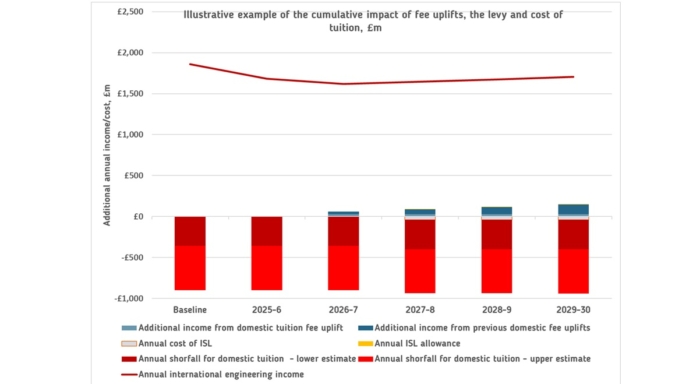Every term, the EPC Chief Executive, Johnny Rich, provides an update to EPC reps in each university and to the Heads & Deans Community about the big stories from the policy landscape and the impact for Engineering higher education. Here’s his latest update for Spring 2025.
Two cheers for applications
Given the state of the world right now, I thought I’d start with some good news. UCAS reports that in the application cycle to the end of January deadline, undergraduate applications to engineering are up by 14.5%. That follows a similar rise last year.
Before you break out the Lidl sparkling wine, last year’s increase was not reflected by an increase in students admitted to study engineering. That’s because, by the EPC’s reckoning, it now costs between £18k and £19k per year to teach an engineering undergraduate. Depending on the course, the funding for home students in England is likely to be around £9,500 next year or about £11k with top-up high-cost course funding. In other parts of the UK, it’s even less.
For most universities, that £8k+ shortfall is more than the marginal cost of taking on an extra student. That means that, when previously, if you needed to make ends meet you would just try and pack more bums on seats to spread the cost, now each extra bum is increasing your losses. Unless they’re international bums, of course.
Meanwhile, our colleagues in arts and humanities are facing cuts in their departments because their costs have now caught up with their income. So their tuition fees are no longer able to cross-subsidise engineering.
Still, it’s good to know more people want to study engineering… even if we can’t offer them all places. It may mean departments find the recruitment cycle less competitive this year, but it may also create problems for fair access.
Stella Fowler, the EPC’s Director of Research & Policy, has more on all of this which she shared in her recent online Data Dive workshop, which some of you may have attended. Like all our data dives, that was a free event for all EPC members. If you missed it, you can also rummage in the data yourself on the EPC’s Data Explorer which you’ll find in the Resources menu on the website.
You can also read my thoughts on this in a blog I wrote for Wonkhe or in the letter I wrote to the FT on behalf of the EPC following their coverage of the engineering applications story.
Or, on a related topic, we made a pitch to the government for a hike in funding for engineering education if it wants to fulfil its missions on growth, opportunity and regional development. This was in our submission to the Treasury in advance of the Comprehensive Spending Review which will take place later in the year.
As I’m sure you’re aware, the Chancellor made her recent Spring statement in the Commons. There was almost nothing of direct relevance to HE, although she did announce £400m per year would be ‘ringfenced’ for defence innovation. ‘Ringfenced doesn’t necessarily mean more funding. It can be euphemism for not cutting it.
Coincidentally £400m is the exact same amount of money that’s due to be raised by significant increases announced last week in the cost of applications for student visas that may impact recruitment.
Watchdog Watch
Less but more and the same but different
The OfS has published its new strategy and invited consultation responses. It’s not easy to summarise, but mainly because there’s lots of hedged bets. They’re trying to be realistic about what they’re likely to be able to manage, but they don’t want anyone to think they’re going to stop doing anything important or ignore all sorts of other stuff they think they might not have been doing enough of.
For example they talk about being more focused, but also doing more to engage with student views and being more accountable to all stakeholders (that’s not just universities, but students, government, the general public and so on). You can’t blame them: they were roundly slammed on both of these issues in two highly critical review of OfS – one by the House of Lords (which quoted the EPC’s input) and one government-backed report by Sir David Behan, who, following the general election, was installed as interim OfS Chair. More on that later.
OfS will also be using more real-time data – yes, you have heard that before, but this time, they really mean it.
This will help them monitor their new Quality Risk Register, which will highlight the many potential risks to student experience and outcomes and HE providers will be expected to use that to frame performance. Hopefully this will be more nuanced than the conditions-based, one-size-fits-all approach that they’ve been using.
It’s based on E-ORR, the Equality of Opportunity Risk Register, which OfS produced to take a more nuanced approach to access. Access will still be a core priority for OfS (by law it has to be), but rather than being a separate silo, it will be a cross-cutting theme. They claim it will be everywhere. Some feedback has expressed concern it will be nowhere in particular.
Other worries have surrounded the administrative burden on providers and clashes with other sector bodies, such other regulators and accreditation. That’s something we talked about in the EPC response to the consultation which you can find on the site.
Enter the MEDR-verse
Meanwhile in Wales, Vicky Howells, the Tertiary Education Minister in the Welsh Government has been spelling out powers for Medr, the new regulator/funding body for higher education which has replaced HEFCW.
MEDR will be reviewing whether HE provision meets skills needs in terms of strategic planning for Wales. I guess that means they will be considering whether extra funding or incentives are needed to prop up courses that they consider important for priorities like economic growth.
In other words, they may be asking if they are providing enough money to support courses like engineering. It would be nice if they were to decide to fund engineering more strategically.
Bill beyond the border
In Scotland this month, the Parliament is discussing the Tertiary Education and Training (Funding and Governance) (Scotland) Bill. This would give new powers to Scottish Funding Council so that, if it passes, by end next year the SFC would be the sole funder of tertiary education (FE, HE and apprenticeships). In the process it would gain various regulatory powers such as demanding that providers declare certain information (a bit like OfS’s ‘reportable events’ in the English system) and the Minister will have more opportunities to intervene in the wider student interest.
This would align the Scottish funding and regulatory system more closely with the recent changes in Wales, so that SFC looks more like Medr, which in turn is starting to look more like OfS, although OfS is trying to look a little different.
Scottish student maintenance grants, loans and debts will still be managed by SAAS though.
One key difference between SFC and OfS may be in how they respond to universities in crisis. OfS has always been adamant that it would bail out institutions in a financial crisis (but they have to say that, even if they would), whereas OfS has just done exactly that to stop Dundee literally running out of money and declaring bankruptcy in June. They’ve received a £22Mn mix of grants and loans to plug cashflow and the Scottish Government has launched an investigation to find someone to fire.
Changing faces
Just before we leave the world of our regulatory overlords, the Government has named its preferred candidate to take over as Chair of OfS from Sir David Behan (whom I mentioned earlier) who took over on an interim basis from Lord James Wharton, friend and appointee of Boris Johnson, who resigned – or was resigned – immediately after the election.
The winner is… Professor Edward Peck who had already announced that he was about to stand down as Vice Chancellor of Nottingham Trent. He may be a VC, but he’s not a soft touch for the sector. Nor is he expected to be a radical reformer. He’s a philosopher rather than an engineer by academic discipline, but we shouldn’t hold that against him.
As far as I’m aware, Susan Lapworth, OfS’s CEO isn’t going anywhere… for now. So far, she seems to have managed to segue from the Wharton regime, when OfS was widely regarded as incompetent and focused on the wrong things, to David Behan’s more listening style.
However the CEO of UKRI is changing. Professor Dame Ottoline Leyser announced last year that she would be stepping down slightly ahead of the end of her term. Her replacement has now been announced.
And the winner is… Professor Sir Ian Chapman. Currently the Chief Executive of the UK Atomic Energy Authority, he’s a physicist, rather than an engineer, but he is also a Fellow of the Royal Academy of Engineering, so we can claim him.
We also have a new CEO of Innovate UK: Tom Adeyoola who’s described as a tech entrepreneur.
More cuts
As you’ve probably heard, the list of universities cutting jobs has been getting longer. It now includes 400 at Cardiff, 150 at Durham, more at Sheffield, Dundee, Kingston, the list goes on. UCU is predicting 10,000 losses this academic year.
Humanities have been hardest hit, but, as I mentioned earlier, that undermines cross-subsidies to STEM. Engineering may feel relatively protected, but it’s expensive and relies on expensive facilities. For as long as those facilities are usable, it may be more expensive to axe departments than keep them as loss-making, but when they need new investment, that may flip.
Visiting Professors
Finally, I thought I should finish with something slightly less miserable: RAEng’s Visiting Professors scheme has opened again for applications. In case you don’t know, this is up to £30k over 3 years to take on someone from industry or outside academia as a visiting professor.
Obviously, most of the candidates are engineers, but some have expertise in other areas – enterprise, ethics, policy, EDI, strategy – where departments want to improve their offer to students or to colleagues.
The Academy is keen to get as many applications as possible, but in particular they always want to hear from unis that haven’t taken advantage of the scheme previously or potential visiting professors from underrepresented groups. The deadline is 28/4/25.
If you were interested in this policy update, you may also be interested in Johnny’s update on what the EPC has been up to lately.




